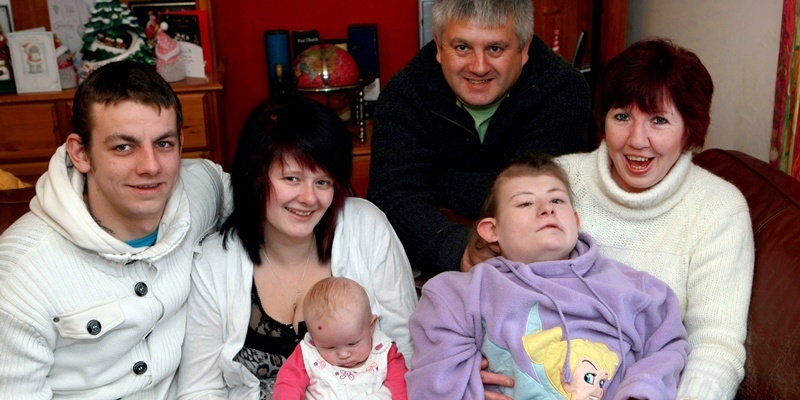The heartbroken parents of a brave Fife girl have said they received a lack of support after her death because the loss of a child remains ”taboo”.
Leah Johnstone from Leuchars died earlier this year following an agonising battle with long-term illness. Her parents Kim and David are now backing a new campaign outlining the need to be ”more open” about death.
They spoke out as an alliance of 40 organisations came together to launch the Good Life, Good Death, Good Grief campaign. The group claims that avoiding thinking or talking about death has a devastating impact, often resulting in bereaved people feeling isolated.
It is a subject very close to the hearts of Kim (40) and 42-year-old David. Their beloved daughter Leah was born with a chromosome disorder, leading to medics predicting she would die within 24 hours.
When the little girl survived, doctors revised their estimate to a week… then a month… then a year…
However, despite severe health problems including deafness, a curved spine and epilepsy, Leah survived until May this year, when she died aged 17.
Kim and David believe they would have received more emotional support throughout the years if the medical professional and friends and family were more able to accept the death of children.
”We were being told Leah would die from the day she was born but we were not offered any kind of support until three years ago when it was suggested we saw a counsellor,” Kim said.
”I do wonder if the unwillingness to accept the death of a child means services to help people cope are not put in place. We also found friends and family were so focused on staying positive that they didn’t want to accept that Leah would die.”
In the months following her death, Kim and David have also faced a battle to keep Leah’s memory alive.
”We have found that since she died it is like she never existed,” Kim said. ”I think people don’t know what to say so they don’t say anything. Death is still a taboo subject.
”However, I want to talk about her. I feel good when I talk about her.”
The Johnstones also believe people need to stop being so scared of death that they want to keep loved ones alive, no matter their quality of life.
Kim, who cared for her daughter full-time, said: ”Leah had regular epileptic fits and each time she came back she was a different little girl. She went from a child who was happy and intelligent to someone going through hell.
”After years of putting on a ventilator to save her, we took the decision that if she stopped breathing we wouldn’t ventilate her again.
”I know a lot of people didn’t understand our decision because to them death was the worst thing that could possibly happen. But for us the worst thing that could happen was that her condition would continue to deteriorate and she would be in pain.”
The decision to establish the Good Life, Good Death, Good Grief campaign comes after research found that most people haven’t talked to their family and friends about the kind of care their loved ones would want at the end of their life, including where they would like to die.
This is despite the same survey finding that 61% of people were scared of dying in hospital and 60% saying that if people felt more comfortable talking about death and dying they would be less likely to die alone.
Group chairwoman Kate Lennon said: ”Death is inevitable for all of us but the problems and stresses we create by the difficulty we have as a society to acknowledge this are not.
”Avoiding thinking and talking about death can mean that people don’t die where they want to, families are left fighting legal battles because of a lack of wills, and the people living with bereavement or serious illness are isolated because no one knows what to say.
”Some people believe it’s morbid to think and talk about death, but it’s not. It’s a sensible way to deal with something that is inevitable for all of us.
”The medical and social care professions also need to get better at talking about death because they play a key role in ensuring people die well.”
The campaign, which was launched in Edinburgh on Tuesday, aims to build on the Scottish Government report Living and Dying Well 2008, which looked at how death is dealt with in Scotland.
Among those attending the launch was Scotland’s poet laureate Liz Lochhead, who read out poems about death and grief. A video highlighting the reluctance of Scots to talk about death was also shown.Find out more at www.goodlifedeathgrief.org.uk
